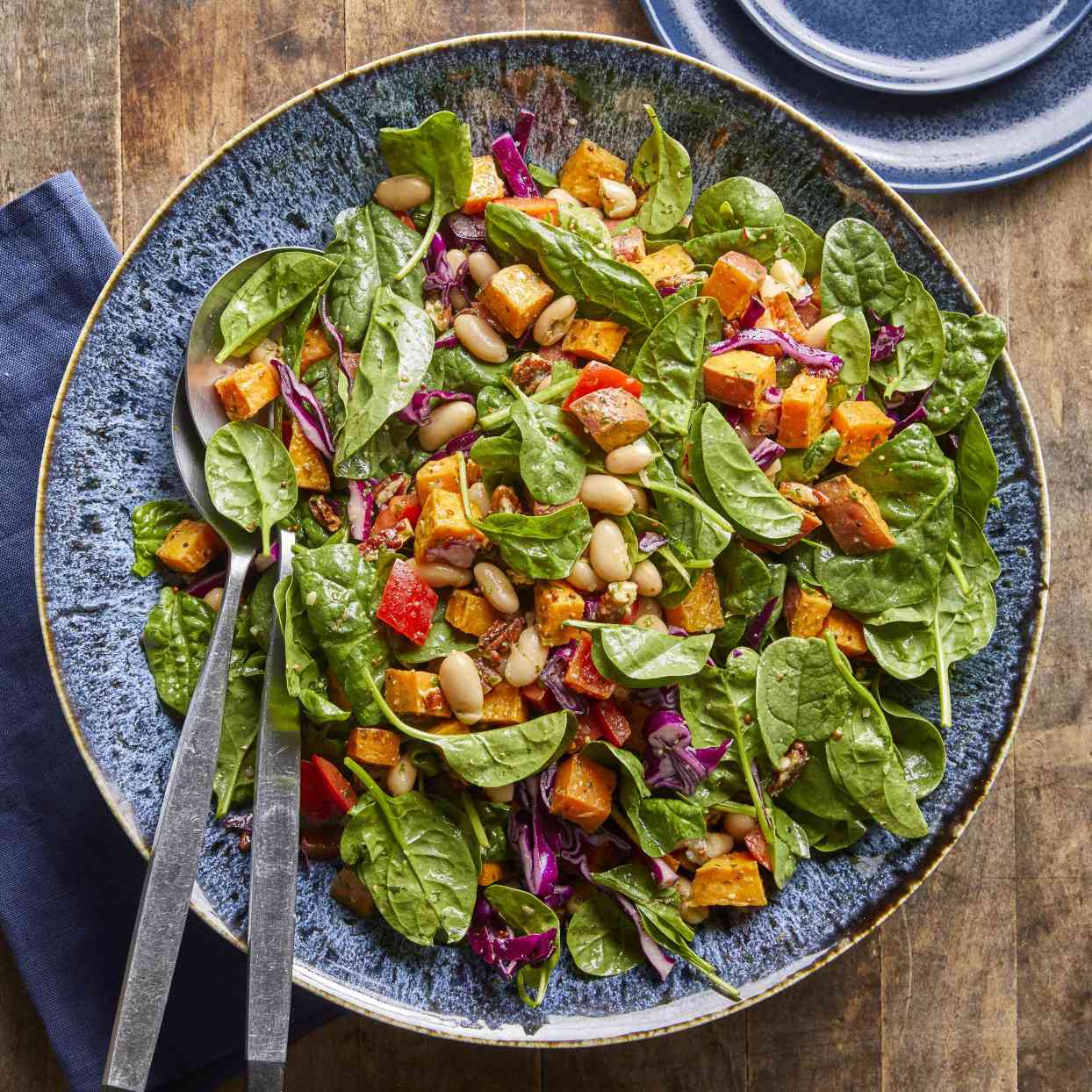
Plant-Based Diet for Diabetes
In short, yes, a plant-based diet can be beneficial if you have diabetes. Research has shown that it can actually help people better manage their diabetes (think better blood sugar balance) and prevent dangerous complications from developing, like heart disease. Additionally, a study in Nutrition & Diabetes saw participants significantly improve BMI and cholesterol levels for people with chronic diseases like diabetes over a six month follow up (they extended the study over a full year and still saw benefits).
That said, it's still important to incorporate the principles of healthy eating for diabetes as you shift to a more plant-based diet. As in, you can't forget about balancing your carb intake throughout the day! A little know-how goes a long way to set you up for success. Here are some tips for going plant-based, if you have diabetes.
Tips for Going Plant-Based for Diabetes
Vary your protein sources
You might feel hesitant about getting enough protein if you cut out meat and animal products. But not to worry—most Americans get plenty of protein to meet their needs, plant-based or not (check out this guide to calculate how much protein you need in a day). The key to maximizing your intake is to diversify your sources of plant-based protein. It's more than just tofu. Foods like seitan, whole grains, legumes, nuts and leafy greens are great vegan sources of protein to help you meet your goals. Recipes like Quinoa Avocado Salad and Sweet Potato-Black Bean Burgers make it delicious.
As with anything, you don't have to be completely plant-based to enjoy the benefits. If you are interested in testing the waters, try swapping out a few meat-based meals a week to start. Swap beef for these Beefless Vegan Tacos or skip chicken and try our Mushroom & Tofu Stir-Fry.
Choose complex carbs
Regardless of your animal protein intake, having a consistent intake of complex carbs is one of the most important factors for helping manage diabetes. Not only do they deliver ample vitamins and nutrients, but also they are packed with protein and fibre to help you feel full and satisfied. Fibre does much more than fill you up, too. It's important for slowing down your digestion, which in turn slows down the rate at which glucose enters your blood stream. As a result, your blood sugars will remain more consistent, unlike the energy-draining spikes and crashes you experience after eating too many simple carbs or sugar-sweetened foods and drinks.
Luckily, complex carbs are plant-based. Choose whole grains like brown rice, oats, whole-wheat bread or whole-wheat pasta to round out your meals. Snack on popcorn or whole-wheat crackers. Other foods like fruits, vegetables and legumes are healthy sources of complex carbs that are the cornerstone of a healthy plant-based diet.
Limit highly processed snacks
Don't be fooled: vegan highly processed snacks are still highly processed snacks. Try to stick to whole foods whenever you can, like celery or fruit with nut butter, pita with hummus or roasted chickpeas, which are all great for curbing hunger and keeping you feeling energized until your next meal. Nuts and seeds are a great grab-and-go snack in a pinch, and they are shelf stable so storing them is a breeze. Try to pair a complex carb with a source of protein and fibre for a well rounded snack.
If you want to prep ahead, we have plenty of plant-based snack recipes like our Savoury Date & Pistachio Bites, Garlic Hummus, Everything Bagel Microwave Popcorn and Strawberry-Pineapple Smoothie. Make a batch in advance to get ready for the week ahead.
That being said, there are plenty of healthy packaged snack options out there, and the convenience just can't be beat when you're in a pinch. When shopping, be sure to look at nutrition labels and go for snacks that have the least amount of added sugar, sodium and saturated fat per serving.
Prioritize certain nutrients
It's totally possible to meet your nutrient needs on a plant-based diet, but if you are fully plant-based it can take a little strategizing. There are a few nutrients that can be scarce in a fully plant-based diet, so here are some things to make room for on your plate.
Vitamin B12 is often found in animal foods, like eggs, meat and fish. It's less common in plant-based foods, but there are still plenty of ways to meet your needs. Some fortified breads, cereals and soy products have vitamin B12 added to them. Plant-based milks, like almond, rice, hemp and coconut milks, can have added vitamin B12 as well, but be sure to check the label. Nutritional yeast is another great plant-based source of vitamin B12. It is delicious sprinkled on popcorn.
Iron is another nutrient of concern for people following a fully plant-based diet. Being sure to include plenty of leafy greens, whole grains and legumes to help you meat your needs. Vitamin C is a nutrient that helps with the absorption of iron, so pair iron-rich foods with high-vitamin C foods like citrus, tomatoes, bell peppers and berries.
For other nutrients like vitamin D, calcium, omega-3s and zinc, check out this guide on how those following a plant-based diet can meet their needs.
Bottom Line
You absolutely can try out a more plant-based eating pattern or go fully plant-based if you have diabetes. In fact, it might even help you manage your diabetes if it is a way of eating that you enjoy. It's important to be strategic and a little know-how can go a long way. These tips will help you pursue your plant-based goals while meeting your nutritional needs. For more recipe inspiration, check out this Vegan Diabetes Diet Plan.
https://www.eatingwell.com/article/7911723/can-you-follow-a-plant-based-diet-if-you-have-diabetes/
No comments:
Post a Comment